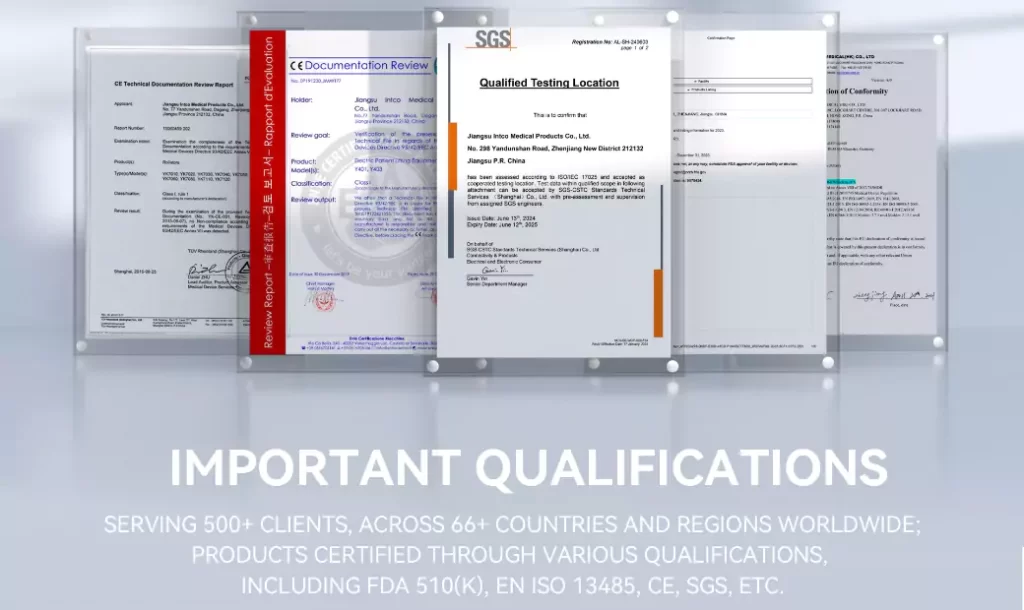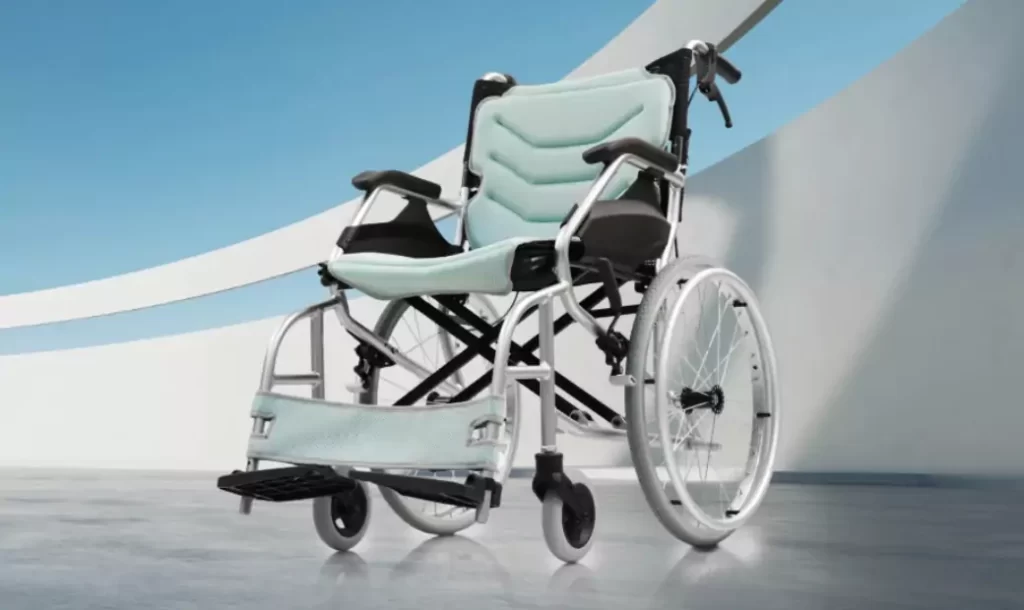Contact Us
Advantages of Buying from a Manual Wheelchair Factory
2025-10-15
For hospitals, distributors, NGOs, rehabilitation centers, and other bulk purchasers (B2B), sourcing manual wheelchairs directly from a factory presents many strategic advantages over buying via intermediaries. By factory we mean a manufacturer (often one offering OEM or ODM services), with end-to-end capabilities.

Cost Efficiency & Better Margins
Reduced Markups
When you buy from a manufacturer rather than through a distributor or retailer, you avoid extra layers of margin. This means lower cost per unit, which is especially important when you order large volumes. Manufacturer pricing tends to be more transparent because production, raw material, and labor costs are accounted for more directly. INTCO’s manufacturing capacity allows economies of scale.
More Favorable Payment & Order Terms
Working directly with a factory often gives you more flexibility in negotiating payment terms (Deposit / balance), minimum order quantities (MOQs), and schedule. For urgent or repeated orders, a factory may allocate production capacity in advance. Factories like INTCO that offer OEM/ODM services are more accustomed to customizing orders and scheduling around customer needs.
OEM-Service-INTCO-Medical-gives-you-original-euqipment-and-manufacture-service-1024x576.jpg)
Customization & Product Adaptation
Tailoring to Market Requirements
Different geographies have different needs—seat widths, backrest heights, footrest styles, wheel sizes (e.g. MAG vs spoke), tire type (PU, pneumatic), etc. A factory with R&D and design capability (such as INTCO) enables you to specify based on your market.
For example, INTCO offers models like the Comfort manual wheelchair (with adjustable seat depth/height, back tube height, quick-release wheels) to meet different customer and user profiles.
OEM / ODM Branding
You may want to sell under your own label or integrate specific branding or features. Factories that provide OEM/ODM services allow this. INTCO, according to its product literature, supports OEM/ODM customization.
Compliance & Regulatory Matching
If you are selling into regulated markets (e.g. EU, US, Middle East), you may need compliance with CE, ISO, FDA or other local certifications. Factories with expertise can build the product to meet those standards—structural strength, safety, flame retardant materials, etc. INTCO claims to uphold certifications and performs tests to meet safety and durability standards.

Quality Control & Assurance
Direct Oversight
By working with a factory, you have more control over production quality. You can inspect audits in situ, oversee material sourcing, inspect manufacturing processes, check defect rates, etc. This is harder to ensure when buying through layers of distribution.
INTCO states that its factory carries out rigorous validation and testing (e.g. fatigue tests, slope stability tests) to ensure safety and durability.
Consistency
Factories that specialize in manual wheelchairs develop mature processes, fixtures, supply chain relationships, tooling, and skilled staff. This translates into consistent product dimensions, performance, and reliability (e.g. consistent weight capacity, welds, frame strength). INTCO’s large volume production and long experience suggest such consistency.
Speed & Supply Chain Reliability
Shorter Lead Times
Without intermediaries, you can reduce steps in the ordering process: direct quotation, direct order, direct shipping. When a factory maintains good internal planning, inventory, and production scheduling, lead times become more predictable.
Greater Flexibility for Reorders and Adjustments
If markets shift (e.g. demand increases, or specifications need adjustment), a factory can adapt more readily. You don’t have to wait for a distributor to change their stock or for someone to negotiate for you.
INTCO’s model lines include versions with adjustable features (seat width, footrest styles, armrests) to meet different user needs.
Reliable Forecasting & Volume Stability
Factories producing in volume tend to be more stable in supply—less risk of “stock-outs” by intermediaries, less margin of error. Also, factories often stock raw materials in larger quantities, reducing risk from supplier disruptions. Long-term contracts with a factory often yield better priority during times of constrained supply.
Product Innovation & R&D Integration
Access to New Materials, Designs, and Technologies
Factories with R&D arms tend to innovate: lighter frames (aluminum alloy vs steel), new materials for wheels and tires, better frame folding mechanisms, flame-retardant fabrics, ergonomic design, etc. INTCO, for example, has been introducing lighter aluminum-based chairs (e.g. its “DOLY” line) and adjustable/quick-release features.
Continuous Improvement & Feedback Loop
As a direct buyer, you can provide feedback to the factory to improve design or correct minor issues, which can be incorporated into future production runs. This is far more cumbersome with intermediaries in between.
Examples from INTCO’s Product Offerings
To make the above more concrete, here are a few instances of how INTCO’s product portfolio illustrates these advantages.
-
ECO: A budget-friendly steel frame chair (single cross-brace) designed for durability; simple features, efficient packing size, lowers cost of ownership.
-
COMFORT: Aluminum frame, adjustable seat depth and height, quick-release wheels, higher weight capacity, more comfort and flexibility.
-
Other Outdoor/Indoor Models: Different features depending on terrain, wheel types, armrests, footrests. Bulk packaging optimized.
What to Look for When Selecting a Factory
Since buying from a factory has significant upside, one must ensure the source is reliable. Key criteria:
-
Certifications & Regulatory Compliance: ISO 7176 (wheelchair standards), ISO 13485 for medical device manufacturing, CE, FDA, RoHS, etc. Check test reports. INTCO claims adherence to such standards.
-
Quality Assurance Processes: Multiple inspection stages, fatigue testing, strength testing, shelf life of materials, etc.
-
Production Capacity and Lead Time: Can the factory meet your demand reliably, with consistent delivery schedules?
-
Customization / Flexibility: OEM/ODM capabilities, ability to adjust specifications, ability to add features or branding.
-
After-Sales Support: Spare parts, warranty, technical support, service centers, logistics.
-
Supply Chain & Logistics Strength: Warehousing, packaging, ability to ship to your country under acceptable costs, ability to deal with customs and import regulations.
-
Sustainability and Ethical Practices: Environmental impact, labor practices, material sourcing.
Potential Challenges & How to Mitigate Them
While factory purchasing has many advantages, there are some risks or challenges. Here are a few, along with mitigations:
| Challenge | Mitigation |
| Minimum order quantities (MOQs) may be large | Negotiate with the factory; combine orders; start with smaller pilot batch; accept simpler models initially |
| Longer development cycles for custom designs | Use existing platforms or modify current models; pick factories with rapid prototyping capacity |
| Logistics and import duties | Partner with factories experienced in export; get transparent shipping, packaging; ensure compliance with import regulations |
| Quality risks if factory is inexperienced | Audit the factory; request samples; inspect certifications; cascade quality criteria into contract |
Summary
For B2B buyers of manual wheelchairs, buying directly from a reliable factory offers significant value: lower total cost of ownership, better customization, higher supply reliability, faster time to market, better innovation, and potential sustainability and competitive differentiation. Suppliers like INTCO Medical illustrate many of these advantages through their product lines, manufacturing scale, OEM/ODM services, strong QA processes, and international reach.
If you are a distributor, NGO, healthcare facility or buyer considering large-volume procurement, evaluating a factory like INTCO against the criteria above can help ensure you secure reliable, cost-effective, high-quality manual wheelchairs suited to your markets.
References
-
World Health Organization. (2012). Wheelchair Service Training Package – Basic Level. World Health Organization. Retrieved from https://www.who.int/publications/i/item/9789241503471
-
Source International. (n.d.). OEM vs. ODM in Manufacturing. Retrieved from https://www.sourceint.com/asia-manufacturing-news/oem-vs-odm-manufacturing/
-
Panasia Solutions. (n.d.). OEM Manufacturing Services. Retrieved from https://panasia.solutions/oem-manufacturing-services/
-
Biotricity. (2025, April 23). Why Buying Medical Devices Directly from the Manufacturer Is the Smarter Choice. Retrieved from https://biotricity.com/2025/04/23/buying_medical_devices_manufacturer_versus_distributor/
-
Shield Works Manufacturing. (n.d.). Advantages of OEM in China for Order Fulfillment. Retrieved from https://shieldworksmfg.com/strategic-advantages-of-oem-manufacturing-in-china-for-order-fulfillment/



